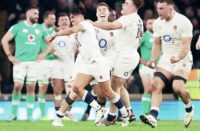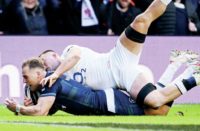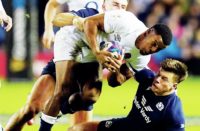 I'm sure you have all seen the TV adverts featuring the England players being carried on the shoulders of supporters as they head towards the O2. I must admit that I find it troubling. As the RFU concentrate all their efforts on making the most of the second World Cup to be staged here in England, a bit of me starts to worry that they are focusing far too much on the players, rather than the competition itself.
I'm sure you have all seen the TV adverts featuring the England players being carried on the shoulders of supporters as they head towards the O2. I must admit that I find it troubling. As the RFU concentrate all their efforts on making the most of the second World Cup to be staged here in England, a bit of me starts to worry that they are focusing far too much on the players, rather than the competition itself.
We all know that England are in an incredibly tough group and will have to be at the very top of their game just to emerge from that stage. To focus so heavily on the team and, in particular certain players, risks taking the ‘collective eye off the ball' and the potential disappointment should the unthinkable happen.
The biggest challenge for the squad will be keeping a sense of proportion as the weight of expectation is slowly ratcheted up. Playing at home has its advantages but it can also be a right pain in the derrière, as an unforgiving media highlight every tiny aspect of squad life!
Despite that, I am glad to see that Stuart Lancaster has followed Geoff Cooke's example and is allowing the players to have short breaks at home with families and partners.
Back in 1991 our base was at Tylney Hall in Hampshire but, unlike the current squad, we were told that we were effectively ‘on tour' at home and would remain in the hotel. When we arrived at our base we were greeted by something new, a sports psychologist, who was to see if there was anything that he could bring to the table, in terms of improving teamwork and focusing on preparation for the upcoming games.
After a week in which he interviewed every member of the squad, asking various questions, “When do you start mentally preparing for the game? How soon do you focus on your opposite number? How close to the game do you switch in to game mode”, he finally called the squad to a meeting.
He told us that having conducted the interviews and correlated the information he had identified, that although players did think about the game for a few days before a match, the real preparation of mental focus was done relatively close (for some, just a few minutes) before the actual kick off. As a result, he said he felt he could offer help to the goal kickers in eliminating the crowd noise and focusing purely on the ball.
For the rest of us, the mere fact that we had achieved the status of an international player, particularly during those amateur days, was testament to the fact that we already had the right mentality and game preparation.
Plus, he thought he could offer no improvements at all, as each of us had a different way of preparing. As it was a purely singular act, each player needed to be sure he was best prepared for what lay ahead for the team. Geoff Cooke took that message on board and after considering what the psychologist had said allowed players some home time realising that being locked in a team group in a virtual prison camp was not essential to create the intensity needed for match days.
Added to this, it tied into Cooke's own belief that you should maintain your usual habits when preparing for a game – whether that included a workout at the gym or a pint on a Friday night. Back then, we as a squad were pretty low key in terms of public recognition – despite having ITV's Jim Rosenthal and his camera crew virtually living with us.
As the second ever World Cup, it had yet to capture the public's imagination, but thanks to Jim's expertise as a measured presenter and the fact we reached the final, rugby managed to break new ground and reach a new audience.
Since then, the media and public interest has steadily increased until 2003 when, with England's win, it exploded and despite Clive Woodward's best efforts to distract media attention from the players, they became the focus of future reporting.
The 2007 Cup saw reports of the need for a player's revolt following a breakdown in trust between coaches and the team, with the senior players reportedly playing a major part in the team reaching the final.
The media reporting of the England teams ‘free time' activities at the 2011 World Cup undermined the whole campaign and saw the man that led England to victory in 2003, sadly, walk away from the game. Four years on and all the efforts of Stuart Lancaster's managements team over that period have been focused on rebuilding player reputation and the brand that is England rugby – and he has succeeded. In doing so, he and his management team have reversed the usual convention of trying to protect the squad from the media and have in fact positively encouraged the media to see the players as being something exceptional to those that had gone before.
As a result, the disappointment (should England fail to win or reach the final stages) could easily disrupt any hope of a successful legacy.
Comments from Lancaster's assistants, that they are ‘in awe' of the players efforts in preparation for the tournament are setting expectations high, perhaps a trifle too high.


























